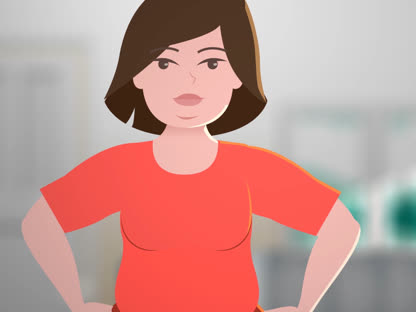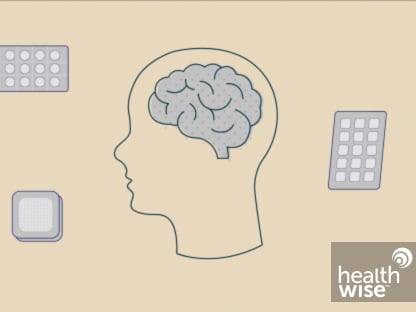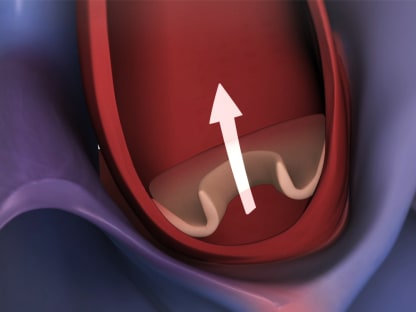Aortic Valve Regurgitation
Condition Basics
What is aortic valve regurgitation?
Aortic valve regurgitation is a problem with the aortic valve.
When you have aortic valve regurgitation, this valve doesn't close as it should. With each heartbeat, some of the blood leaks back (regurgitates) through the aortic valve into the left ventricle. The body doesn't get enough blood, so the heart has to work harder to make up for it.
You can have this problem for a long time and not know it. It may take years for symptoms to start. This is called chronic aortic valve regurgitation.
In rare cases, the valve problem starts suddenly and without warning. This is called acute aortic valve regurgitation. It requires medical help right away.
What causes it?
Any condition that damages the aortic valve can cause aortic regurgitation. Causes of long-term aortic valve regurgitation include heart problems you're born with, calcium buildup on the valve, and an enlarged aorta. Causes of sudden aortic valve regurgitation include endocarditis and trauma to the heart or aorta.
What are the symptoms?
Symptoms include shortness of breath and chest pain or pressure (angina), especially when you're active. You may have trouble breathing at night. You may feel tired and weak. Some people feel very aware of their heartbeat, especially when lying down, or feel their heart beating unevenly (palpitations).
How is it diagnosed?
Your doctor will do a physical exam. Your doctor will ask you questions about your symptoms and past health. You may have an electrocardiogram. Tests like an echocardiogram help confirm the diagnosis. Tests can show how much the valve is leaking and how well the left ventricle of your heart is working.
How is aortic valve regurgitation treated?
Your doctor will see you regularly. Your doctor will recommend a heart-healthy lifestyle. You may take medicine to lower blood pressure, relieve symptoms, or help your heart work better. You may choose to have surgery to replace the valve.
Cause
Any condition that damages the aortic valve can cause aortic valve regurgitation. Causes of chronic (long-term) valve problems include:
- Being born with a bicuspid aortic valve.
- Calcium buildup on the valve.
- Enlargement of the aorta.
- Rheumatic fever.
Causes of sudden (acute) aortic valve regurgitation include:
- Endocarditis. This is an infection in the heart.
- Aortic dissection. This means that the inner layer of the aorta separates from the middle layer.
- Problems with a replacement aortic valve.
- Trauma to the heart valve or aorta.
Symptoms
You may not have any symptoms for a long time. If symptoms do appear, it may mean that your heart is severely affected.
Symptoms include:
- Shortness of breath, especially when you're active.
- Fatigue and weakness.
- Fainting (syncope).
- Trouble breathing at night.
- Swelling in the legs and sometimes the rest of the body (edema).
- Awareness of the heartbeat, especially when lying down.
- Dizziness and lightheadedness.
- Abnormal heartbeats (palpitations).
- Chest pain or pressure (angina), often brought on by exertion.
The condition can also happen suddenly. This is known as acute aortic regurgitation. In this case, the symptoms are sudden, often more intense, and life-threatening. This is an emergency.
When to Call
Acute aortic valve regurgitation is a medical emergency. Call 911 immediately if you have:
- Chest pain.
- Severe shortness of breath.
- A rapid heart rate.
- Lightheadedness or fainting.
- Weakness.
- Confusion.
Treatment Overview
Your treatment will depend on how severe the regurgitation is and if you have symptoms.
In most people, aortic valve regurgitation starts slowly. Your doctor will probably recommend a heart-healthy lifestyle. This lifestyle means that you:
- Quit smoking and stay away from secondhand smoke.
- Follow a heart-healthy diet.
- Be active. Ask your doctor what level and type of exercise is safe for you.
- Stay at a healthy weight, or lose weight if you need to.
- Manage other health problems such as high blood pressure.
Your doctor will see you regularly to check on your heart. Your doctor may prescribe medicine to lower blood pressure, relieve symptoms, or help your heart work better.
If long-term regurgitation is severe, if symptoms appear, or if your heart doesn't pump as well as it should, you may choose to have valve replacement surgery. You'll need surgery right away if the condition starts suddenly and is also severe.
Learn more
Self-Care
You can live a full and active life by doing things that help keep your heart and body healthy. Here's how.
- Have a heart-healthy lifestyle.
- If you smoke, try to quit. Medicines and counseling can help you quit for good. Avoid secondhand smoke too.
- Eat heart-healthy foods. These foods include vegetables, fruits, nuts, beans, lean meat, fish, and whole grains. Limit things that aren't so good for your heart, like sodium, alcohol, and sugar.
- Be active but don't start an exercise program on your own without talking with your doctor first. You may need some tests to see what kind and level of exercise is safe for you. Try for at least 30 minutes of activity on most days of the week. If activity is not likely to cause health problems, you probably do not have limits on the type or level of activity that you can do. If your condition is severe, your doctor will likely advise you to avoid strenuous activity.
- Stay at a healthy weight. Lose weight if you need to.
- Manage other health problems. These include diabetes, high blood pressure, and high cholesterol. If you think you may have a problem with alcohol or drug use, talk to your doctor.
- Take care of yourself.
- Call your doctor right away if you have new symptoms or symptoms that get worse.
- Go to your checkup appointments. And get the tests you need to assess your heart, such as echocardiograms.
- Take your medicines exactly as prescribed. Call your doctor if you think you are having a problem with your medicine.
- Practice good dental hygiene and have regular checkups. Good dental health is especially important. That's because bacteria can spread from teeth and gums to the heart valves.
- Get a flu vaccine every year. And get a pneumococcal vaccine. If you've had one before, ask your doctor if you need another dose. Stay up to date on your COVID-19 vaccines.
- Talk with your doctor if you have concerns about sex and your heart. Your doctor can help you know if or when it's okay for you to have sex.
Learn more
Watch
Surgery
Valve replacement surgery is done to help you feel better and live longer. Surgery to repair the aortic valve may be done in certain cases.
To help decide if you want surgery, you and your doctor will look at your overall health, your heart health, and how bad your regurgitation is.
Your doctor may check:
- Your symptoms, if you have any.
- Your ejection fraction. This is how much blood your heart is pumping out to your body.
- The size of your left ventricle.
If you have surgery, you can choose a mechanical or tissue valve to replace your heart valve.
Learn more
Watch
Credits
Current as of: July 31, 2024
Author: Ignite Healthwise, LLC Staff
Clinical Review Board
All Ignite Healthwise, LLC education is reviewed by a team that includes physicians, nurses, advanced practitioners, registered dieticians, and other healthcare professionals.
Current as of: July 31, 2024
Author: Ignite Healthwise, LLC Staff
Clinical Review Board
All Ignite Healthwise, LLC education is reviewed by a team that includes physicians, nurses, advanced practitioners, registered dieticians, and other healthcare professionals.










